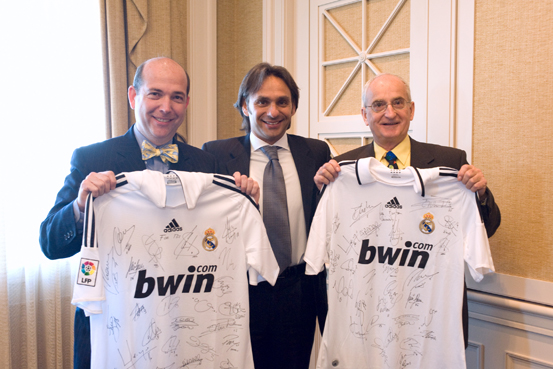Spanish Soccer Champs to Get a Scientific Kick
Sports psychologists hook up with Real Madrid

An unprecedented agreement among Boston University, MIT, and Real Madrid, Europe’s most successful soccer franchise, will soon provide aspiring sports psychologists the chance to work with some of the world’s finest athletes.
Facilitated by Leonard Zaichkowsky, a professor of counseling psychology at the School of Education and at the School of Medicine and director of sports psychology training at BU, the agreement’s aim is to propel researchers toward a better understanding of the role of motivation, nutrition, and exercise in improving athletic performance and in helping people age well.
From a BU perspective, the deal opens the door for students to work with the reigning Spanish champions, plus implement findings back home with the University’s own sports teams.
 Real Madrid, meanwhile, is hoping to get a few more years out of its stars. Typically, a professional male soccer player’s career begins in his late teens and ends in his early 30s. Better nutrition, exercise routines, and injury prevention could extend that span.
Real Madrid, meanwhile, is hoping to get a few more years out of its stars. Typically, a professional male soccer player’s career begins in his late teens and ends in his early 30s. Better nutrition, exercise routines, and injury prevention could extend that span.
For MIT, the agreement represents a complement to AgeLab, its research center whose mission is to help people live longer and better. In theory, if an athlete’s career can be lengthened through better physiological practices, so could a quality lifespan for the nonathlete.
BU Today asked representatives from each party how they expect the agreement to benefit their institutions.
Leonard Zaichkowsky, School of Education and School of Medicine professor: “For BU, it’s a win-win. Our graduate students will have the opportunity to spend a month or a semester observing and working with high performers in Spain. We can learn a lot from high-end athletes and how this generalizes to the general population.”
 Joseph Coughlin, MIT AgeLab director: “We hope to take a systems perspective to leverage the technology we have in our labs and to work with colleagues in engineering and engineering systems. For example, a number of our colleagues are working on a spacesuit for the trip to Mars. That kind of technology could benefit some sports here on Earth as well as older adults.”
Joseph Coughlin, MIT AgeLab director: “We hope to take a systems perspective to leverage the technology we have in our labs and to work with colleagues in engineering and engineering systems. For example, a number of our colleagues are working on a spacesuit for the trip to Mars. That kind of technology could benefit some sports here on Earth as well as older adults.”
Valter di Salvo, Real Madrid High Performance Centre: “We have the know-how working with the football [soccer] players and other athletes, but the universities have great knowledge in terms of research and technology. We want to create synergy between BU, MIT, and Real Madrid that can help the students, but more importantly, the normal person will benefit because all these things we try with top-level athletes, we will then transfer. We want to move in this sense, to not only extend life, but the career of our players. If they know themselves better, follow a specific program, work on injury prevention, they can extend their careers, just like people extend their lives and improve their quality of life."
Edward A. Brown can be reached at ebrown@bu.edu.
Comments & Discussion
Boston University moderates comments to facilitate an informed, substantive, civil conversation. Abusive, profane, self-promotional, misleading, incoherent or off-topic comments will be rejected. Moderators are staffed during regular business hours (EST) and can only accept comments written in English. Statistics or facts must include a citation or a link to the citation.